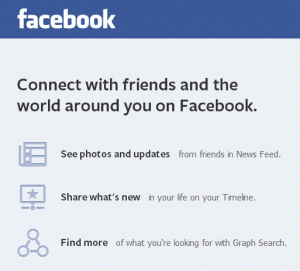 This month has seen a flurry of articles published about Facebook turning 10. From the beginning, I always likened Facebook to AOL: a place in cyberspace that for many is synonymous with the internet. Facebook has remained very accessible to non-technical users who never have to leave the walled garden for news, play games, or chat with “friends”. I am certainly not the first person to make the comparison with AOL, but I find it very apt as new user growth slows and the engagement of younger users is questioned in the face of competition from newer social networks like Whats App, Kik and SnapChat.
This month has seen a flurry of articles published about Facebook turning 10. From the beginning, I always likened Facebook to AOL: a place in cyberspace that for many is synonymous with the internet. Facebook has remained very accessible to non-technical users who never have to leave the walled garden for news, play games, or chat with “friends”. I am certainly not the first person to make the comparison with AOL, but I find it very apt as new user growth slows and the engagement of younger users is questioned in the face of competition from newer social networks like Whats App, Kik and SnapChat.
Unlike AOL however, Facebook has proven to be an agile company, as it managed to change its focus from the web browser user interface to the smartphone experience. It seems like an obvious thing to do now, but even two years ago, the shift to a mobile first strategy was not a sure bet. The rapid change in direction, for a company of Facebook’s size, all while maintaining impressive revenue growth, is remarkable. Now, Facebook must face another challenge: where does growth come from when everyone who has internet access and wants a Facebook account already has one? The answer is to make Facebook advertising more compelling in combination with offering unique consumer data to marketers. It is not an easy one two punch to pull off, without diluting the user experience and respecting users’ desire for privacy.
I can see two paths for Facebook in the long term. The first is a merger or close partnership with a large tech company who wants to stay relevant with consumers. I can envision Microsoft, Sony or Samsung participating to push their plethora of consumer electronic gadgets, but not Apple. Facebook would be a bit too messy for Apple, and the company does not have a corporate history of major acquisitions or partnerships on this scale.
The other path would be an acquisition by a large non-tech company that sells to consumers. I am thinking about companies such as Proctor & Gamble and Unilever in packaged goods and Wal-Mart or Costco in the retail space. All of these companies and their competitors are constantly searching for new ways to reach consumers and to sell their wares. However, their traditional avenues for growth have limits: there only so many locations to put new stores, and there is a limit to how fast markets (especially foreign markets in emerging economies) can be developed for innovative consumer products. Even a manufacturing company, like GE or GM, could be interested. Controlling the Facebook marketing channel would be a unique way to add value for their dealers and customers. Can we throw in a few million dollars worth of Facebook advertising with that gas turbine to sweeten the deal? How about every GM dealership in world dominating Facebook with their ads?
For the moment, Facebook has captured the imagination of investors, is well capitalized and very profitable. Ultimately though, Zuckerberg and Sandberg have a altruistic vision of universal internet access that might be equally well served by an unusual acquisition or merger when they can no longer consistently deliver exceptional revenue and profit growth.